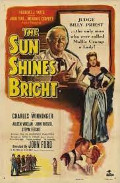
Directed by
John Ford
92 minutes
Rated PG
Reviewed by
Bernard Hemingway

The Sun Shines Bright
If you came to John Ford’s film cold you’d be forgiven for thinking that it had been made twenty years earlier. In fact it was – by Ford himself with Will Rogers, then a fêted purveyor of homespun wisdom, playing the central role of Judge Priest, a part here essayed with geniality by Charles Winnenger.
I haven’t seen the earlier version but for 1933 this film with its Norman Rockwell-ish nostalgia for simpler times, not to mention its creaky studio-bound production values,would have made sense. But for 1953 it is a considerable anomaly (Douglas Sirk’s All I Desire was released the same year, Elia Kazan’s On The Waterfront the following year).
Set in post-Reconstruction Kentucky when North/South grievances from the Civil War were still alive The Sun Shines Bright (the title is taken from an 1853 Stephen Foster song, ‘My Old Kentucky Home’) is a well-meaning plea for racial harmony and moral tolerance. This ideal is borne out by the avuncular Judge, seen over the four incidents that form the film’s narrative, involving a black teenager, a former prostitute, her daughter by one of the town’s eminences, and a lynch mob set on stringin’ up the aforesaid teenager for raping a white girl.
Whilst the best part of the film is its handling of the prostitute and her daughter axis which climaxes in classic "cast the first stone" scene, Ford’s plea for racial tolerance is, certainly by today’s standards, undermined by his near ludicrous depiction of black people as lovable, bongo-lipped, pop-eyed, shufflin' goofballs notably in the person of the Judge’s black manservant (Stepin Fetchit).
Apparently Ford listed this as one of his personal favourites from his own catalogue but that itself is a reflection of the sentimentality that dates the film badly.
Want something different?





